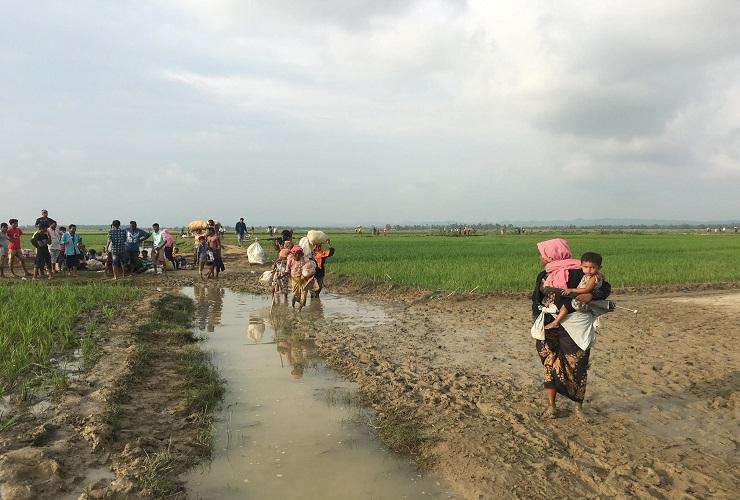ASIACALLING
Rohingya and the mood in Myanmar
"Within Myanmar, few are defending the Rohingya. Aung San Suu Kyi, and the military operation enjoy widespread support. Why are the Rohingya the most persecuted of all Myanmar's ethnic minorities?"
Kannikar Petchkaew

In recent weeks, more than 420 000 Rohingya have fled their homes in Myanmar, seeking safety in neighbouring Bangladesh.
The ethnic minority group is being targeted by the country’s military, as people are killed and raped, and villages burned down.
It is a text book case of ethnic cleansing, according to the United Nations and human rights groups.
The international community is condemning the violence and mounting humanitarian disaster, calling on de facto leader Aung San Suu Kyi to bring it to an end.
But within Myanmar, few are defending the Rohingya. Aung San Suu Kyi, and the military operation enjoy widespread support.
Asia Calling reporter Kannikar Petchkaew gauges the mood in Myanmar.
Armed conflict and human rights abuses are escalating in Rakhine State.
Meanwhile, a war of words is raging on Myanmar’s social media.
Hate speech is circulating wildly. Fierce confrontations are breaking out.
The loudest voices by far are those that support the army operation targeting the Rohingya minority.
Those voices refuse to call Rohingya by their name, Rohingya. Instead, they’re called Bengali.
In fact, most people in Myanmar believe that’s who they are. And many want to see them wiped out.
In Myanmar, many support the army’s actions.
There’s also plenty of support for the government, especially Aung San Suu Kyi who is called “beloved Mother Su.”
Rohingya have lived in Myanmar for centuries. Most arrived from Bangladesh and India in the British colonial period.
The resentment towards them has deep historical roots.
Rohingya have been targeted since the country gained independence from the British in 1948.
Since 1982, Rohingya have been denied citizenship. They have no ID cards, no basic rights, their land has been seized. They are a stateless people.
They’ve also been left off the list of the country's 135 official ethnic groups.
Hate propaganda has circulated for decades, spreading the belief that minority groups, including the Rohingya are a threat to Myanmar’s dominant Burmese race.
U Myo Win is the Executive Director of the Yangon-based Smile Education and Development Foundation. He says since 1985, propaganda has been circulated in a series of books promoted by the government, saturating the country with hostility towards Rohinyga.
“Practically I noticed this since 1985, consequently they make a strategic systematic propaganda. The biggest countrywide campaign against [the] Muslim minority,” stated Win.
Independent media group, Shwe Myitmakha, is known for its strong defence of civil rights and minorities.
I visited their office in Yangon, and met with founder and respected journalist May Thingyan Hein.
When I asked her opinion on the Rohingya question, she told me that she refers to the group as ‘Bengalis’. She does not consider them ethnic people of Myanmar.
May Thingyan Hein has long promoted the rights of Myanmar’s ethnic minority groups.
She has also stood up against the military, and because of that she has been a fugitive, interrogated, arrested, and her works banned.
But when it comes to the Rohingya, long time dissident, May Thingyan Hein agrees with the Government.
“Now they are fighting. Burn their houses and other house and kill other people. That’s not good. This is a conflict, they made the conflict,” she told me.
Despite her usual defense of human rights, May Thingyan Hein echoes what most people in Myanmar believe, that the Rohingya want land, and a Muslim state in Rakhine.
“This is not Human Rights issue. Because they need the land. They want the land. This is not Human Rights issue. This is not the religion issue. They want the land,” she stated.
Most people in Myanmar would agree.
Rohingya have had their land seized since the 1960s. And have been pushed out of Mynamar in successive waves of violence since the 1970s. Now, more live outside Myanmar than inside the country.
Phil Robertson, Deputy Director of Human Rights Watch, Asia, says this latest surge in violence and persecution is not isolated.
It is part of a much longer, systematic attempt to wipe the Rohingya out of Myanmar.
“People don't really recognize that there are still over thirty thousand refugees from the ethnic cleansing that took place back in 1992-1993 against the Rohingya,” Robertson said. “They are still in Bangladesh.”
When Rohinya insurgents attacked a police post on August 25th, the Thatmadaw, or military unleashed horrific violence, claiming they are conducting a ‘clearance operation’ against Rohingya terrorists.
Given most people in Myanmar see the Rohingya as a threat, it wasn’t hard to justify abuses to people within Myanmar.
Rohingya suffer the worst persecution in Myanmar. But Robertson says minority groups all over the country are targeted by the military.
“The situation for the Rohingya is bleak but I would say the situation on Human Rights issues in Burma is similarly bleak,” he commented. “I think the Rohingya represent the sort of the worst case of the bad situation that growing there.”
- Rakhine state
- Myanmar
- Rohingya
- Aung San Suu Kyi
Komentar
KBR percaya pembaca situs ini adalah orang-orang yang cerdas dan terpelajar. Karena itu mari kita gunakan kata-kata yang santun di dalam kolom komentar ini. Kalimat yang sopan, menjauhi prasangka SARA (suku, agama, ras dan antargolongan), pasti akan lebih didengar. Yuk, kita praktikkan!